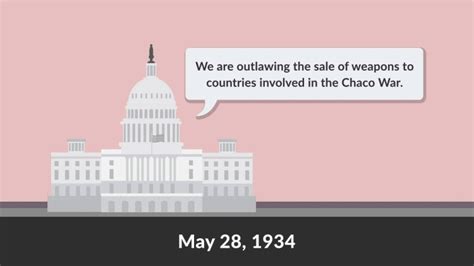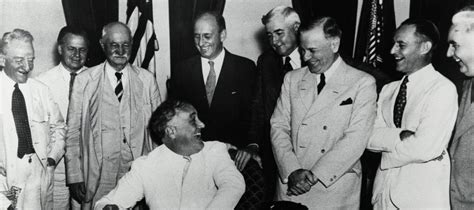United States V. Curtisswright Export Corp.

The United States v. Curtiss-Wright Export Corp. case, decided in 1936, is a landmark Supreme Court decision that has had a profound impact on the development of foreign affairs law in the United States. The case involved a challenge to the constitutionality of a joint resolution passed by Congress, which authorized the President to impose an embargo on the sale of arms and munitions to countries engaged in the Chaco War, a conflict between Bolivia and Paraguay. The Curtiss-Wright Export Corp., a company that had contracted to sell arms to Bolivia, argued that the joint resolution was an unconstitutional delegation of power to the President, as it allowed him to unilaterally impose an embargo without providing any guidelines or standards for its implementation.
The Supreme Court’s Decision

The Supreme Court, in a 7-1 decision, upheld the constitutionality of the joint resolution, holding that the President has broad authority to conduct foreign affairs and that Congress may delegate its power to the President in this area. The Court, in an opinion written by Justice George Sutherland, relied heavily on the concept of inherent presidential power, which holds that the President has certain powers that are not explicitly granted by the Constitution but are necessary for the effective conduct of foreign affairs. The Court also relied on the idea of congressional acquiescence, which holds that Congress’s failure to object to the President’s actions in a particular area constitutes implicit approval of those actions.
The Concept of Inherent Presidential Power
The concept of inherent presidential power is a controversial and complex doctrine that has been the subject of much debate among scholars and jurists. Proponents of the doctrine argue that it is necessary for the President to have certain powers that are not explicitly granted by the Constitution in order to effectively conduct foreign affairs and protect national security. They point to the fact that the Constitution does not provide a detailed framework for the conduct of foreign affairs and that the President must therefore have some degree of flexibility and discretion in this area. Critics of the doctrine, on the other hand, argue that it is a dangerous and unconstitutional expansion of presidential power, as it allows the President to act without any clear limits or checks on his authority.
| Key Provisions | Relevant Case Law |
|---|---|
| Inherent Presidential Power | United States v. Curtiss-Wright Export Corp. (1936) |
| Congressional Acquiescence | Youngstown Sheet & Tube Co. v. Sawyer (1952) |
| Separation of Powers | Marbury v. Madison (1803) |

Key Points
- The United States v. Curtiss-Wright Export Corp. case established the concept of inherent presidential power in the area of foreign affairs.
- The Supreme Court held that Congress may delegate its power to the President in the area of foreign affairs, as long as the delegation is not overly broad or vague.
- The decision has been widely criticized for its potential to undermine the system of checks and balances and to expand presidential power beyond constitutional limits.
- The concept of inherent presidential power remains a controversial and complex doctrine that continues to be debated among scholars and jurists today.
- The Curtiss-Wright decision has significant implications for the conduct of foreign affairs and the balance of power between the President and Congress in this area.
Implications of the Decision

The implications of the Curtiss-Wright decision are far-reaching and have had a significant impact on the development of foreign affairs law in the United States. The decision has been cited in numerous cases involving the President’s authority to conduct foreign affairs, including cases involving the use of military force, the imposition of economic sanctions, and the negotiation of treaties. The decision has also been used to justify the expansion of presidential power in other areas, such as national security and emergency management.
Criticisms of the Decision
Critics of the Curtiss-Wright decision argue that it is a dangerous and unconstitutional expansion of presidential power, as it allows the President to act without any clear limits or checks on his authority. They point to the fact that the decision has been used to justify a wide range of presidential actions, from the use of military force to the imposition of economic sanctions, without any clear congressional authorization or oversight. They also argue that the decision undermines the system of checks and balances, which is a fundamental principle of the US Constitution.
What is the concept of inherent presidential power?
+The concept of inherent presidential power holds that the President has certain powers that are not explicitly granted by the Constitution but are necessary for the effective conduct of foreign affairs.
What are the implications of the Curtiss-Wright decision?
+The implications of the Curtiss-Wright decision are far-reaching and have had a significant impact on the development of foreign affairs law in the United States. The decision has been cited in numerous cases involving the President's authority to conduct foreign affairs.
What are the criticisms of the Curtiss-Wright decision?
+Critics of the Curtiss-Wright decision argue that it is a dangerous and unconstitutional expansion of presidential power, as it allows the President to act without any clear limits or checks on his authority.
In conclusion, the United States v. Curtiss-Wright Export Corp. case is a significant precedent in the area of foreign affairs law, as it established the concept of inherent presidential power and the idea of congressional acquiescence. While the decision has been widely criticized for its potential to undermine the system of checks and balances, it remains a widely cited and influential precedent in the area of foreign affairs law. As the United States continues to navigate the complex and ever-changing landscape of international relations, the implications of the Curtiss-Wright decision will likely remain a topic of debate and discussion among scholars, jurists, and policymakers.



